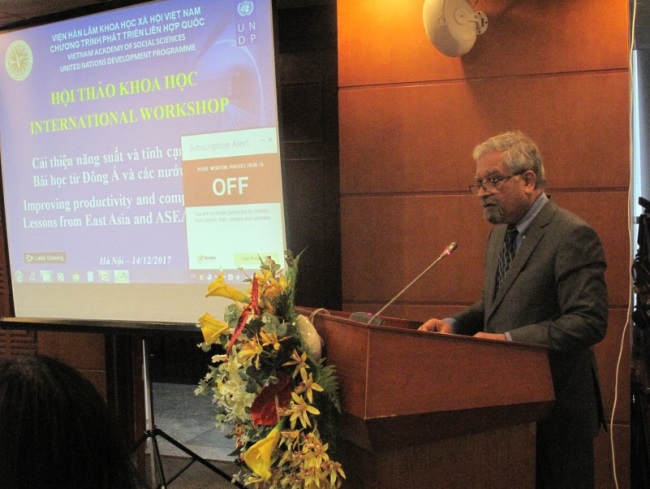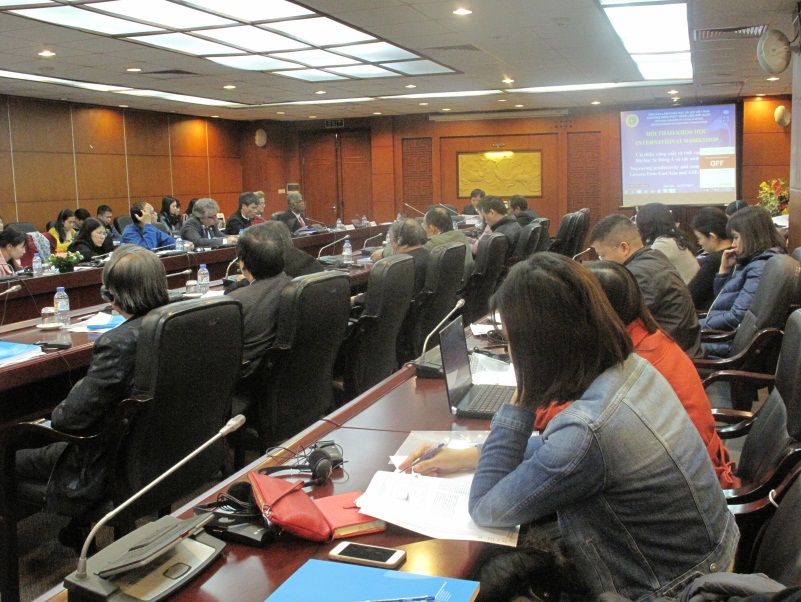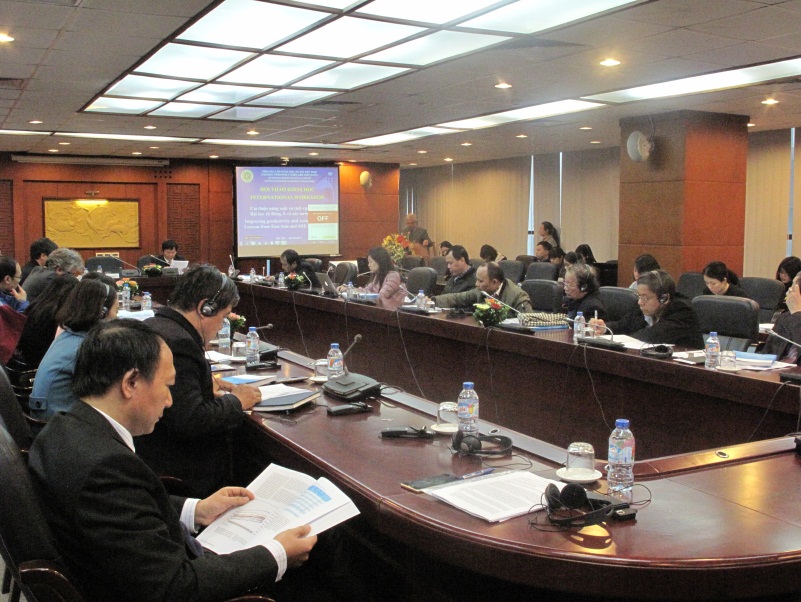Attending the workshop, the Vietnamese side was attended by the Vietnam Academy of Social Sciences, Prof. PhD. Nguyen Quang Thuan, President of VASS; Representatives of leaders and scientists from the Institute for Southeast Asian Studies, the Institute for North East Asia Studies, the Vietnam Institute of Economics, the Institute of World Economics and Politics, the Centre for Analysis and Forecasting of VASS and from other institutes of Ministry of Planning and Investment, Ministry of Agriculture and Rural Development. UNDP was headed by Mr. Kamal Malhotra - the United Nations’ Resident Coordinator and Resident Representative of the UNDP in Vietnam; Ms. Caitlin Wiesen - UNDP Vietnam Director; GS. Rajah Rasiah, University of Malaya, Senior Advisor of UN/UNDP in Vietnam.
President of VASS- Prof. PhD. Nguyen Quang Thuan and Mr. Kamal Malhotra, the United Nations’ Resident Coordinator, hosted the workshop.
In the world, the global economy has shifted to "new normal" growth trajectory with lower growth rates than in the coming decades. There have been significant changes related to globalization, as well as the acceleration of technological progress that many experts called it as the fourth technological revolution.
In Vietnam, the period of hot growth taking place in the second half of last decade has left long-term consequences for further treatment. After more than five years of macroeconomic stabilization and restructuring, the economy has surpassed the most difficult period, the growth has started to recover and inflation has been controlled. However, in order to bring the economy back to a fast and sustainable growth path, Vietnam needs to address a number of issues, through the restructuring of the economy coupled with the transformation of the new growth model, in line with actual domestic conditions, the context of the times, and the general development law.
Opening speech at the workshop, on behalf of the Academy's leaders, Prof. PhD. Nguyen Quang Thuan warmly welcomed the participation of the participants, thanked to the effective cooperation between VASS and UNDP; He also emphasized that the theme of the workshop was significant because productivity and international competitiveness were key factors to help Vietnam grow rapidly and sustainably in the new context in the world as well as in the country. Improving productivity was one of the top priorities of the Vietnamese government's agenda. Thanks to consistently far-reaching reforms since the reform cause (Doi Moi), Vietnam has entered the transition process from phase 1 of the development with growth based mainly on the increase of inputs to the second phase of development with growth based mainly on efficiency and productivity. However, although efficiency-based growth was urgently needed, it was not enough to drive the economy forward as this momentum has limited ceiling. International theory and experience showed that only creative innovation was a motivation without boundaries, which was the key to helping some East Asian countries overcome the "middle income trap."
|
|
|
 |
In his speech, Kamal Malhotra reviewed the Human Development Report - Joint Product of VASS and UNDP in 2016 - showing that increasing productivity and competitiveness to create more jobs with higher productivity for all Vietnamese is the key to enabling Vietnam's overwhelming growth in the next stage of development and achieving a desire to overcome the low middle-income trap.
Mr. Kamal Malhotra shared: Firstly, although Vietnam has achieved good results in primary and secondary education, if it was to increase productivity, competitiveness and creativity, it was necessary to strengthen education of science, technology and higher education to provide high quality human resources and R&D researchers;
Secondly, it was important for Vietnam to create independent “think tanks” organizations and strong educational institutions; Thirdly, as innovation is the most important component of success in increasing productivity and competitiveness, Vietnam needed to improve its science and technology institutes to help businesses, especially small and medium businesses that use R & D, adapted to revolutionary 4.0; Fourth, create close linkages between higher education and S & T institutes and “think tank”, organizations, which were the keys to success; Fifth, a green economy and resilience to disasters were essential to increase productivity and competitiveness; Sixth, the universality of economic growth was very important. Vietnam needed to increase the level of inclusive growth in the next phase and create special and preferential opportunities for vulnerable groups and regions.
The workshop was attended by two speakers with the presentation of PhD. Nguyen Thang, Director of the Center for Predictive and Analysis under VASS - Productivity in Vietnam: Selected Issues and Prof. Rajah, University of Malaya - Improving Productivity and Competitiveness: Lessons from East Asia and ASEAN Countries.
In his speech, PhD. Nguyen Thang presented a number of Vietnamese studies on productivity and competitiveness. This new study identified practical obstacles to provide information for the development of concrete actions to improve the productivity and competitiveness of Vietnamese enterprises in specific sub-sectors.
In the report, Prof. Rajah mentioned that Vietnam needed to upgrade technologies to stimulate productivity growth, while focusing on policies to stimulate structural change from low value-added activities to high value added activities, to revive the momentum of productivity growth in the economy. Vietnam also needed to review its policies on human capital development, emphasizing the need to strengthen technical education and training science and technology education and education at world level as well as emphasizing the importance of developing cognitive skills (creativity). In addition, Vietnam needed to implement strategies to link domestic companies to FDI firms and to global value chains. Manufacturing industry and knowledge-based services should be given special attention in the effort to upgrade...
 |
|
 |
The seminar received many comments, exchanges and open questions of participants such as should Vietnam choose to import technology or to innovate. With the experience of other countries, what were the tools for the government to promote? How Vietnam would attract the resources of gray matter of overseas Vietnamese? ... The participants also emphasized the actual situation of Vietnam, suggesting some concrete solutions based on the positiveness.
Nguyen Xuan Khoat







